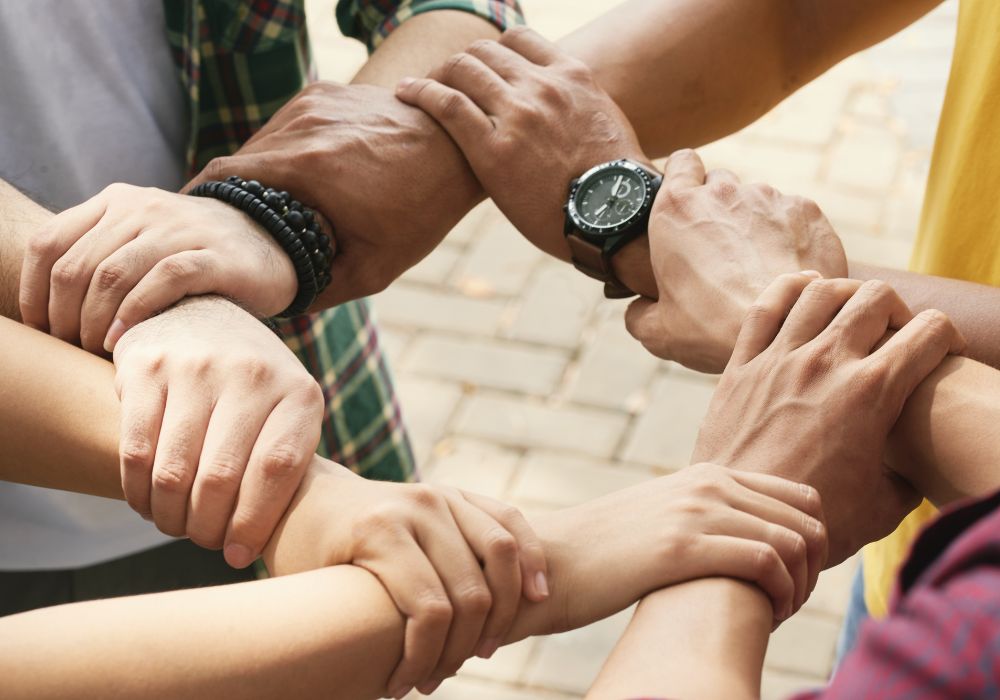Since we live in a social world, our Social Support relationships are crucial in shaping who we are. They affect our outlook on life in general and how we deal with it when things get tough. Whether it is wanting someone to celebrate good times with or a reassuring hug from a friend when life gets hard, our relationships with other people play a significant role in our day-to-day lives. They form the basis for practical as well as emotional support and are crucial for our holistic well-being.
Moreover, humanistic psychologists argue that the need for love and belongingness is fundamental to all of us. Therefore, interpersonal relationships are of foremost importance for fulfilling this need and allowing us to grow further as individuals.
What Is Social Support?
In simple terms, social support can be understood as the companionship we receive from our relationships with others. Whether it is a friend who offers emotional support, a family member who takes care of you while you’re unwell, or a colleague who offers genuine advice, supportive relationships can significantly enhance your mental health. What is common in all these relationships is that they include individuals who provide genuine concern and empathy.
When you think of people around you who support you, you think of people who are your well-wishers. Look at it this way: having social support is like having your personal cheerleaders, people who have got your back no matter what. Whether you need someone to vent to or a shoulder to cry on, social support can make a massive difference in the way you perceive and deal with hardships.
Why Is Social Support Important?
Everyone is always talking about the significance of supportive relationships, but have you ever wondered how exactly they impact our physical and mental health? Well, let’s take a look at what research has to say about it.
Psychologists, to a great degree, agree that there are two pathways by which social support affects our physical and mental well-being:
1. Buffering Hypothesis: Those favoring the buffering hypothesis argue that social support acts as a protective buffer. This essentially means that social support protects us from the negative impact of stress by enhancing our ability to cope with challenging situations.
2. Direct Effect Hypothesis: This theory holds that social support itself directly benefits an individual’s well-being by enhancing the body’s physical responses to challenging situations.
So, whether it is by forming a protective layer or directly shielding us against stressors, the fact remains that the effect of social support on our health cannot be overlooked. Additionally, psychologists assess the level of social support a person perceives to have as a direct measure of their subjective well-being. Findings suggest that those with more secure and healthy relationships are more satisfied with their lives and have an overall positive outlook toward life.
Studies have also found that people who share strong and supportive relationships with family, friends, colleagues, etc., are less vulnerable to chronic disorders as well as many mental health issues.
Some other research-based benefits of social support are:
● Contributes to positive mental health by providing a source of validation, understanding, and motivation
● Boosts the immune system, lowers blood pressure, and promotes faster recovery
● Fosters a sense of self-worth and validation, thus increasing confidence
● It helps while coping with major life transitions and promotes resilience
● Extends lifespan by contributing to a healthier lifestyle and positive behaviors during health challenges.
● Fulfills the need for acceptance, love, and belongingness.
Types Of Social Support
● Emotional Support: Social support provides us with emotional comfort, empathy, and a sense of belonging. It helps us cope with stress, reduces feelings of loneliness, and promotes overall emotional well-being.
● Practical Support: Involves practical assistance, such as help with daily tasks, financial support, or guidance in decision-making. This tangible aid can alleviate burdens and improve our quality of life.
Sometimes, merely being surrounded by the right people can make all the difference. As we move through life, we make many new bonds and connections. Every significant relationship we have shaped our social world and our level of perceived social support.
In the first few years of our life, our social world revolves mainly around immediate family members who become the source of love, care, and unconditional positive regard. As we mature, we make new friends as well as romantic partners who provide us with intimacy and a sense of belonging. All our relationships collectively form our support system. They make sure that as we navigate through the challenges of life, we have a solid support network that has got our back. Sometimes, just knowing you are not alone gives you the strength to face challenging situations.
Ways To Seek Social Support
If you’re looking to expand your social circle and find supportive relationships, there’s no better time than now. Here are some excellent ways to discover and nurture those connections
● Reach Out More: Maybe the loving and supporting relationships you need are already there; a little effort to connect more to trusted friends and family members can provide you with a space to share your thoughts, concerns, or experiences.
● Engage In Hobbies And Activities: Engage in activities and hobbies that really light you up. It’s a great way to meet people who are into the same stuff as you. If you’re lucky, you might be able to find your new best friend while playing a game of badminton or in a dance class.
● Make The Best Use Of Technology: Digital communities are game changers when it comes to finding social support. Online groups and forums can help you connect with people from different backgrounds. Moreover, they offer the additional advantage where you can remain anonymous while you ask for someone’s honest opinions and advice.
● Seek Professional Help: If you ever find yourself in need of support, don’t hesitate to reach out to professionals who are trained to help. They offer more than just a listening ear; they provide unbiased guidance, assist in exploring your emotions, and equip you with strategies to tackle challenges head-on. Remember, seeking help is a sign of strength, and a supportive relationship with a counselor can work wonders for your mental well-being.
Remember, building supportive relationships takes time and effort. Be open and approachable; social support is a two-way street. The principle of reciprocity works here, too, so be the support you want to see in your relationships!





